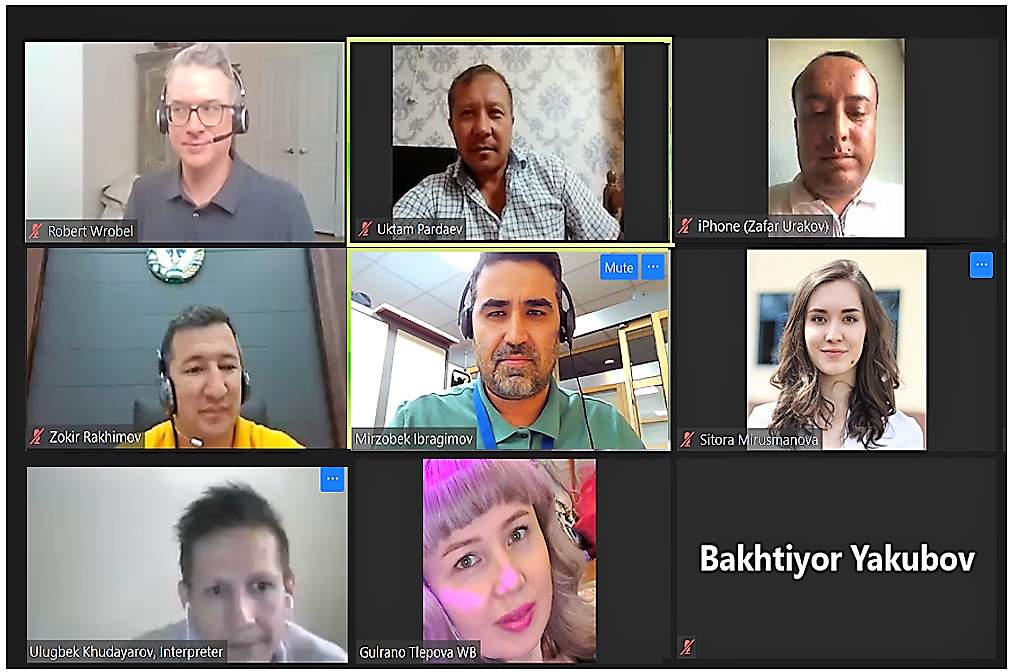
Project Implementation Unit and World Bank officials meet with civil society activist
The Project Implementation Unit (PIU) for the Rural Infrastructure Development Project and World Bank officials organized the latest in a series of meetings with Mr. Uktam Pardaev, a civil society activist from Jizzakh region to discuss project goals and activities in the region. During a video conference call, Mr. Zafar Urakov, PIU Director, and Mr. Robert Wrobel, World Bank Senior Social Development Specialist, engaged in a constructive discussion with Mr. Uktam Pardaev on a number of issues related to the Rural Infrastructure Development Project. Mr. Pardaev verbally presented the preliminary findings of monitoring activities he conducted independently focusing on project activities in villages of Jizzakh region. The RIDP aims not only to finance community-level services and infrastructure and raise the living standards of hundreds of thousands of citizens in over 300 remote villages of the country, but to do so with the active involvement of local community members to identify priority areas for investments and monitor implementation of project activities. The PIU is open for dialogue with civil society organizations and activists and welcomes their constructive feedback related to the project activities. It is crucial for the project success as it helps improve the implementation process and achieve the above-mentioned development objectives. As a part of its ongoing dialogue, the PIU organizes regular video calls with Mr. Pardayev. Since May 2021, four meetings have been held with the civil society activist, including one in person, when the PIU Director paid a working visit to Jizzakh region. During such meetings, Mr. Pardaev shares findings of his independent monitoring focusing on project activities in villages in Jizzakh region, gets an update from the PIU and World Bank on the project progress, and feedback and clarifications on his monitoring findings. This time Mr. Pardaev verbally presented findings of the monitoring carried out in Muzbuloq village of Bakhmal district of Jizzakh region. He drew attention of the meeting participants to the need to improve certain infrastructure there, including bridges, roads affected by floods and piped drinking water systems. Mr. Pardaev also urged to improve awareness among communities of the project and its community mobilization and decision-making processes. The PIU and the World Bank officials thanked Mr. Pardayev for his monitoring activities and encouraged him to submit the report containing the preliminary findings through the project’s grievance redress mechanism (GRM) so the PIU could take the necessary follow-up measures. The PIU and the World Bank officials also noted that the principles of broad-based, gender-sensitive and inclusive community participation are embedded into the RIDP’s design and operating guidelines. However, the project’s community mobilization had to be adapted from its original design to introduce health and safety measures to reduce the risk of spreading COVID-19 when gathering beneficiaries’ communities. These measures aimed at safeguarding health of project beneficiaries, have unfortunately constrained participation levels in the project’s community-level meetings. Nevertheless, the PIU is actively working with village facilitators and regional PIU staff to find alternative means to ensure that local communities are fully informed about project activities and involved in the respective processes, including village-level needs assessment, development planning decisions, and oversight of subproject on rehabilitation and construction works. These activities also include improved access to the project information via the PIU-administered website and social media, for instance, Telegram-channel(https://t.me/uzb_ridp), among other measures, noted Mr. Urakov In addition, Mr. Pardayev was informed that the PIU has contracted two Facilitating Partners (FPs) to lead community mobilization activities in the villages covered by the project in Ferghana, Andijan, and Namangan regions. One of the competitively selected FPs is a consortium of international and national NGOs(http://ridp.uz/en/news-details/69), including the Agency for Technical Cooperation and Development – ACTED (France), the International Secretariat for Water (Canada), Nationwide Movement ‘Yuksalish’ (Uzbekistan), and Center for support and development of population ‘Taraqqiyot’ in Ferghana city (Uzbekistan). Their experience in community development programs is expected to also bring new ideas on how to increase community participation and awareness levels in the current challenging context. It was noted that the Anti-Corruption Agency of Uzbekistan is tasked to ensure open and transparent use of the project funds, according to the Resolution of the President of Uzbekistan dated November 25, 2020. Last week, Akmal Burkhanov, Agency Director, joined the PIU staff during their mission to the Ferghana Valley to learn about the project progress(http://ridp.uz/en/news-details/74). The ACA would be exercising constant control over the project implementation. Mr. Urakov one more time invited Mr. Pardaev to continue sharing the findings of his monitoring activities through the project’s GRM so his team could react accordingly and take any necessary corrective measures. The PIU is open for cooperation with Mr. Pardaev and other independent civil society organizations and activists and it will continue ensuring the project’s openness and transparency. The PIU staff is ready to facilitate Mr. Pardaev’s monitoring activities and offers him to join PIU staff when they make visits to the villages covered by the project during their working missions, Mr. Urakov repeated. Constructive dialogue with civil society organizations and activists will help improve project implementation and achieve its development goals in the interest of hundreds of thousands of beneficiaries living in remote villages in the five regions of Uzbekistan.